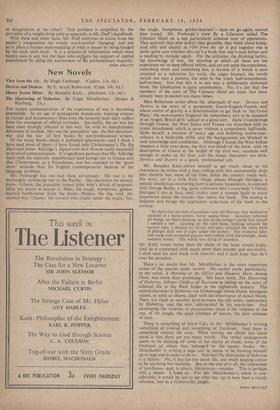New Novels
THE honest communication of the experience of war is becoming impossible. In an age of propaganda broadcasts, training courses in morale and documentary films even the honestly kept diary suffers from the contagion of official attitudes. Inevitably, the air war has been most strongly affected in this way; for with its melodramatic directness of combat, this was the journalists' war, the film-directors' war and the war of first books by non-professional writers.
Of the many books about it published afterwards—and I think I have read most of them—I have found only Clostermann's The Big Show and James Aldridge's Signed with their Honour really successful in terms of communication. It's significant perhaps that Mr. Aldridge deals with the relatively unpublicised (and losing) war in Greece and that Clostermann, as a Frenchman, was less exposed to the 'good show' attitude than his English contemporaries because of the language problem.
Mr. Fosburgh has not had these advantages. His war is the thoroughly written-up war in the Pacific. His characters we already know: Gibson, the journalist turned pilot who's afraid of responsi- bility but learns to accept it; Mike, the tough, bumptious, golden- hearted bomb-aimer from the slums; Homer, the big, wild, shy country-boy; Chester, the coward- who cracks under the strain; Tex, the tough, bumptious, golden-hearted"— here we go again, second time round. Mr. Fosburgh's crew fly a Liberator called The Upstairs Maid on a not particularly arduous tour of operations. They quarrel; they play poker; they grumble; they think about home. And ably and cleanly as View from the Air is put together one is never quite sure whether this isn't a book that one's read before and is reading by mistake again. For the attitudes, the drinking habits, the knowledge of fear, the spurting of relief—all these are the experience we've been offered before, and yet not quite the experience, something more and something less, a version of it which is now accepted as a substitute for truth, the edges blunted, the words sorted out into a pattern, the ache in the vitals half-remembered, half-written. Not that this is in any way a deliberately dishonest book; the falsification is quite unconscious. No, it's just that the. members of the crew of The Upstairs Maid are types that have already been projected too many times.
Miss Robertson writes about the aftermath of war. Devices and Desires is the story of a peripatetic Dutch-English-French waif whose centre of gravity is a determination to get back to 'the Good Place,' the west-country England she remembers, and to be accepted in an Angela Brayil girls' school as a good sort. 1-lebe' wanderings through Greece, the West Indies and France are described with an ironic detachment which is never without a sympathetic half-smile. Hebe herself, a mixture of weary age and bubbling twelve-year- oldness, is a believable child, and the backgrounds are blocked in with knowledge and confidence. Although I found the West Indian chapters a little over-done, the first two-thirds of the book, with its description of Greece at the height of the civil war, succeeds well enough to make up for that; and the minor characters are alive. Devices and Desires is a good, professional job.
Mr. Benedict Kiely allows himself to get much closer to his characters; he writes with a free, rolling style that occasionally skids into rhetoric but, most of the time, holds the country roads well." His story, 'set in a little Irish village, places Donagh Hartigan, a spindly intellectual recovering from a nervous breakdown, in contrast with George Butler, a big, gusty extrovert who's everybody's friend; Hartigan's too at first, until rivalry over a woman leads to nasty discoveries about the murder that opens the book. The ending is defeatist and brings the unpleasant undertaste of the book to the surface:
To them that are sick of jaundice, said old Marcus, that meditative cuckold of a horse-jockey, honey seems bitter. Jaundice yellowed all things, set them shaking, so that at the bridge I could fool myself I needed a rest. Leaning on the cold stone, looking towards the narrow lake, I cleared my throat and spat, watched the white blob of phlegm drift out of sight under the arches, The withered lake- side reeds and crumpled grasses were yellow with old sunlight, dead, tasteless honey. The world was dying of jaundice.
Mr. Kiely writes better than the shape of the book would imply. And he is concerned with much more than murder and sex-rivalry. I shall read his next book with interest; and I shall hope that he's over his jaundice.
There's no doubt that Mr. Mittelholzer is the most important writer of the quartet under review. His earlier work, particularly, to my mind, A Morning at the Office and Shadows Move Among Them, was more than promising. His latest book, The Harrowing of Hubertus, follows Children of Kaywana in taking up the story of colonial life in the West Indies in the eighteenth century. The central character is Hubertus van GirOenwagel whose Dutch bourgeois values, as solid as cheese, clash with his inheritance of mixed blood. There is a clash at another level between the old order, represented by Hubertus, and the new, represented by his son-in-law. And enveloping the violence of personalities there is the violence of the sun, of the jungle, the quiet violence of insects, the slow violence of heat.
JOHN METCALF


































 Previous page
Previous page